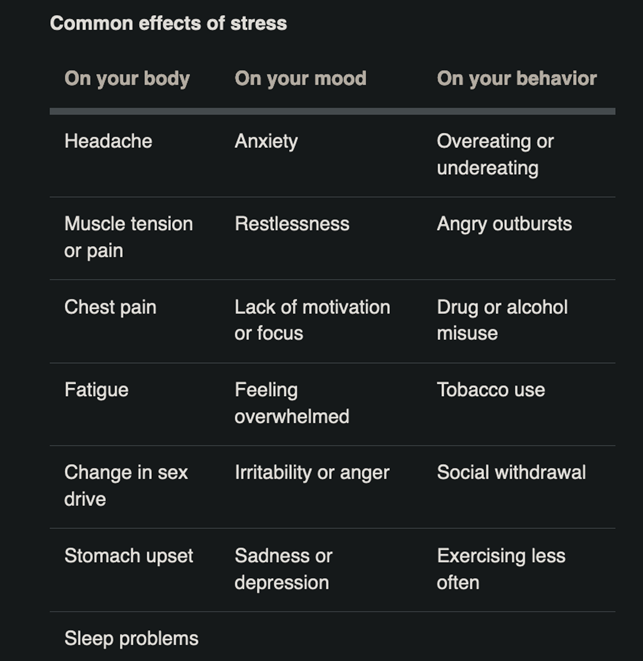Doctors Corner
Welcome to our new webpage. In this space you will monthly columns relating to you health—latest developments in medicine, controversial topics ranging from what supplements are useful to take to what foods are healthy or dangerous to eat. We will also provide updated information about trending disease management, new treatments and much more! Join us every month for the Doctor’s corner.
Stress Management: How Stress Impacts the Body & What You Can Do
By: Michael A. McDonough, Medical/Science Writer
Stress is a continuous element of our daily lives that impacts us both individually and collectively as human beings. Stress’s mental and bodily components of strain and anguish have a profoundly negative impact on one’s physical and mental health. In most exhibitions of stress, it is primarily confined to a person’s mental faculties, subconsciously projected to others through their subtle change in physical behaviors. When the origin of stress is not addressed, but sustained for a prolonged period, health complications may arise that can strongly impact your livelihood. A 2021 article by the Mayo Clinic chronicles a list of common effects that verify the role of stress as a major life obstacle, shown below:

Figure 1, provided by https://www.mayoclinic.org/healthy-lifestyle/stress-management/in-depth/stress-symptoms/art-20050987
These complications, while not fatal on their own, are seriously damaging to one’s health and independence over an extended duration. If you or a loved one are experiencing the above symptoms over an uninterrupted, week-long period, please consult your doctor or corresponding healthcare professional. The Mayo Clinic provides an accurate summary of stress’s variety of afflictions. However, there is an important distinction to be made regarding stress. I will use the example of a student as it is a very accessible point of reference. As a student, it is not uncommon to be stressed during the midterm/final period, as you must prepare for exams on a multitude of vastly different subjects during a period of up to two weeks. However, say for a particular course, a student completes no assignments and hardly attends class. Their stress is deferred temporarily, as unless other external forces intervene, they can continue to neglect their academic duties. The impact of stress is not delayed in this scenario, as most people in this situation are considerably burdened by its lingering impact, which will continue to negatively influence their health if not confronted.
Considering this example, long-term/problematic stress should not be abandoned. There are two solutions: either the source of stress is settled, or it needs to be actively treated by the individual. Harvard Health Publishing maintains two primary solutions, cognitive behavioral therapy (CBT) to alter negative thinking into positivity, and proactive goalsetting to accomplish a sense of control. Additionally, Mayo Clinic suggests several ways to manage stress, which include, physical activity, relaxation techniques (such as yoga, deep breathing, mediation, or massage), maintaining a hobby, or engaging in social activities with friends and family. Over the past two years, visiting family and friends was no longer an option for people across the globe.
The continuation of the COVID-19 pandemic has dramatically increased mental and emotional tension among many Americans, making stress a more mutually established experience. The Center for Disease Control and Prevention (CDC) published an article several months ago regarding the stressful barrier of COVID-19’s social distancing, addressing how people can combat its impact on their mental health. These measures include, removing oneself from news and social media, adopting a consistent sleeping schedule & healthy diet (limiting cholesterol, salt, saturated fats, and added sugars), avoiding or limiting drug and alcohol consumption, and communicating with friends and family through online platforms (such as Zoom, Skype, Discord, etc) to simulate real-life social interactions. As the pandemic shows no sign of suspension, stress revolving around public safety will be a collective concern for most Americans. It is crucial that you adhere to a healthy and productive lifestyle so that stress is not given the chance to rise. Discovering new ways to occupy time, relax, and be comfortable is necessary to take full control of your life. Not only will you be able to prevent stress— but you will obtain a greater sense of self-fulfillment that most people cannot experience.
Checklist: Stressless
- Eat healthy: vegetables, lean meats, whole grains, and reduce saturated fat/sugar intake
- Get at least thirty minutes of activity per day (or 150 minutes/week)
- Limit social media as much as you feasibly can
- Discover new hobbies or become re-acquainted with old ones
- Practice breathing exercises + therapeutic self-care
- Engage with your friends and family
- Resolve the source of your stress (if doable)
- Learn something new every day
- (Optional) Read a book every month
References
Centers for Disease Control and Prevention. (2022, March 25). Coping with Stress. Centers for Disease Control and Prevention. Retrieved May 16, 2022, from https://www.cdc.gov/mentalhealth/stress-coping/cope-with-stress/index.html
Harvard Health Publishing. (2015, January 8). Best Ways to Manage Stress. Harvard Health. Retrieved May 16, 2022, from https://www.health.harvard.edu/mind-and-mood/best-ways-to-manage-stress
Mayo Clinic Staff. (2021, March 24). How stress affects your body and behavior. Mayo Clinic. Retrieved May 17, 2022, from https://www.mayoclinic.org/healthy-lifestyle/stress-management/in-depth/stress-symptoms/art-20050987
